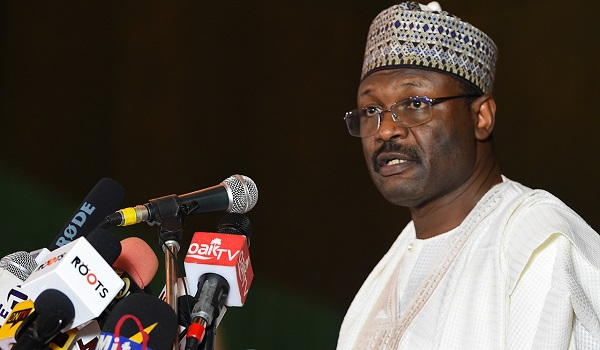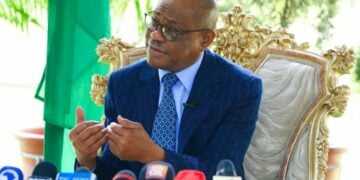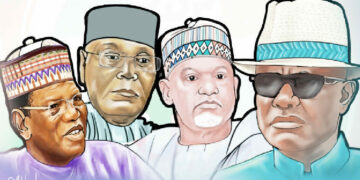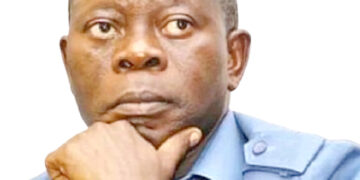When democracy returned on May 29, 1999, nearly 15 years after President Shehu Shagari was overthrown by Major-General Muhammadu Buhari (retd), many expressed hope that, at last, democracy had arrived. Nearly 24 years after the berthing of this unbroken democracy, events surrounding the conduct of the February 25th Presidential and National Assembly polls have shown ill-omened signals that the months ahead could turn out calamitous for democracy, if the present growing public dissension is not properly handled.
While the victory of the presidential candidate of the All Progressives Congress (APC), Senator Bola Ahmed Tinubu, has attracted condemnation among citizens as it is expected, the anger among the populace is threatening to sweep across the nation over, not only the polls, but the suffering unleashed on citizens on account of the naira redesign, among other issues.
More worrisome, the present gloom is made worse, taking into consideration that both Tinubu and the candidate of the Peoples Democratic Party (PDP), Alhaji Atiku Abubakar, are contesting the last election of their lives. The former Lagos governor described the presidential race as his life ambition, while Atiku, famed for being a perennial candidate for the presidency in the past 30 years, sees the 2023 polls as his last chance to be elected president.
Ahead of the polls that have continued to ignite discordant voices on the outcome among youths, various social media platforms were turned into battlegrounds as supporters of the frontline parties sparked storm of conspiracy theories that are now prologue to legal fireworks in the coming weeks on the inviolability of Tinubu as elected president.
In the battle to uphold or tear down into shred the sanctity of the presidential poll, no effort has been spared in portraying the Professor Mahmood Yakubu-led Independent National Electoral Commission (INEC) as a hireling in doing the biddings of one of the political candidates.
The obvious glitches encountered in the deployment of the Bimodal Voter Accreditation System (BVAS) during the last polls as shown in the alleged disparity in votes recorded between polling and collation centres has led to calls for the cancellation of the presidential poll.
For those who have followed events leading to the February 25th polls, the elements of desperation among politicians and the attempt to subjugate the electoral process gained ascendancy among those seeking public office. The repositioning of hope by electorates on INEC to deliver credible polls was hinged on the promise by the commision that results of the polls would be transmitted electronically from the polling units.
Throughout the 16 years of the PDP in power, electoral malpractices were always seen as normal means in defeating opposition. Even Umaru Musa Yar’Adua acknowledged as flawed the result that shot him to the presidency in 2007.
Apart from the 2015 polls that brought General Muhammadu Buhari into power, the 2019 polls were described as an electoral robbery that was perpetuated under the watch of a president who was a serial victim of several years of electoral malpractices that were supervised by the PDP. Known to be ‘someone who is for everybody and not for anybody’, many had looked up to the sanctity of the 2023 polls since Buhari was not on the ballot. Known for his neutrality and not-too-involved disposition on issues that do not affect him personally, many believed that the legacy of the former Head of State would be more concerned with ensuring fair polls for the nation.
The naira redesign policy, with its unmitigated hardship on citizens, was seen as an integral strategy by Buhari to prevent vote-buying. While Nigerians were too willing to sacrifice anything for the dawn of a new electoral process, the results of the polls proved unsatisfactory for members of other parties who now accuse the electoral commission of favouring Tinubu.
All the accusations against INEC are still mere allegations that will in the coming weeks become the focus of legal battles among dozens of legal luminaries. The country could have been spared electoral litigation if only the commission had electronically transmitted election results from the polling units. As INEC begins the reconfiguration of the BVAS, after allowing the physical inspection of sensitive voting material by the litigating parties, many are feverishly hoping that the target of reconfiguring the BVAS can be achieved in good time for the Governorship and State Houses of Assembly slated to hold next Saturday.
The frustration of holding transparent polls has always remained an albatross for Nigeria’s democracy. The desperation of politicians in ensuring victory for themselves and their cronies, no matter the cost, has made the task of cleansing the electoral system an uphill task. For the sanctity of the ballot to be upheld, the manner in which leaders emerge must stand the scrutiny of the law.
Unfortunately, while there appear to be anxious moments for politicians to win elections by all means, the absence of an internal mechanism to checkmate them is totally absent. When the rules of the game are allowed to be violated by people with financial muscle, then democracy becomes a commodity available for the highest bidder. When democracy, as defined by the wealthy, is allowed to grow and thrive, the tyranny of the jackboot regime anchored on the common good is to be preferred. Fortunately, we are yet to reach this point of giving up on democracy.
Political leaders must wake up to current realities that have turned citizens into pawns in the hands of these devious power-seekers and manipulators. Poverty has now become the weapon with which impoverished electorates are controlled. Having acquired stupendous wealth and built economic empires stronger than their states, some of these governors now recruit the poor to truncate any opposing force challenging their dominance.
If the corrupt urge among public office holders for winning polls at all costs is to be curbed, the need for the masses to rise up and stick to the rules of the game must be embraced. As it is now, Nigeria’s democracy is for self-empowerment and building cronies that are expected to defend them in the future.
Some of our governors have become too rich and, therefore, have become the all-knowing leaders, since material prosperity at the disposition has erroneously earned them the title of ‘Wise Men’. Democracy suffers at the centre because the nature of political development is the aggregation of the type of politics practised in the states.
Considering the footprints of some of these governors who have transformed into tyrants and crusher of opposition, the future of our democratic growth has been imperiled, not because democracy is incapable of standing for the public good, but the popular form of government has been held hostage as anti-democratic troops and their fawners of state governors, now emperors, are in active collaboration with members of the State Houses of Assembly to weaken democracy.
Much as INEC has postponed today’s polls to next week, the danger ahead is visible as March 11 polls could turn out to be a titanic battle for the souls of states that are suffering civil tyranny. Not only are the electorate seeking freedom from their long chains, the deployment of religion and ethnicity cast long shadows on the elasticity of citizens to endure the pangs of cruel policies crafted to dehumanise and reduce citizens into nothingness.
The dynamics of March 11 polls won’t be the same. INEC whose impartiality has been an issue of outrageous discourse must insist in standing up for the common good. The electronic transfer of election results from polling units should not be an option but a necessity that must be. Anything less than this should be acceptable for next week’s elections.
Without doubts, the storm of doubts that is trailing the February 25th polls should not be allowed to repeat itself. President Buhari and INEC owe Nigerians free and credible polls so that dealers in the acquisition of political power through corruption are not allowed to starve democracy of the energy required to survive.
When democracy becomes uncertain; people must unite for their inalienable rights to elect their leaders through a transparency process that upholds the sacredness of the ballot.





